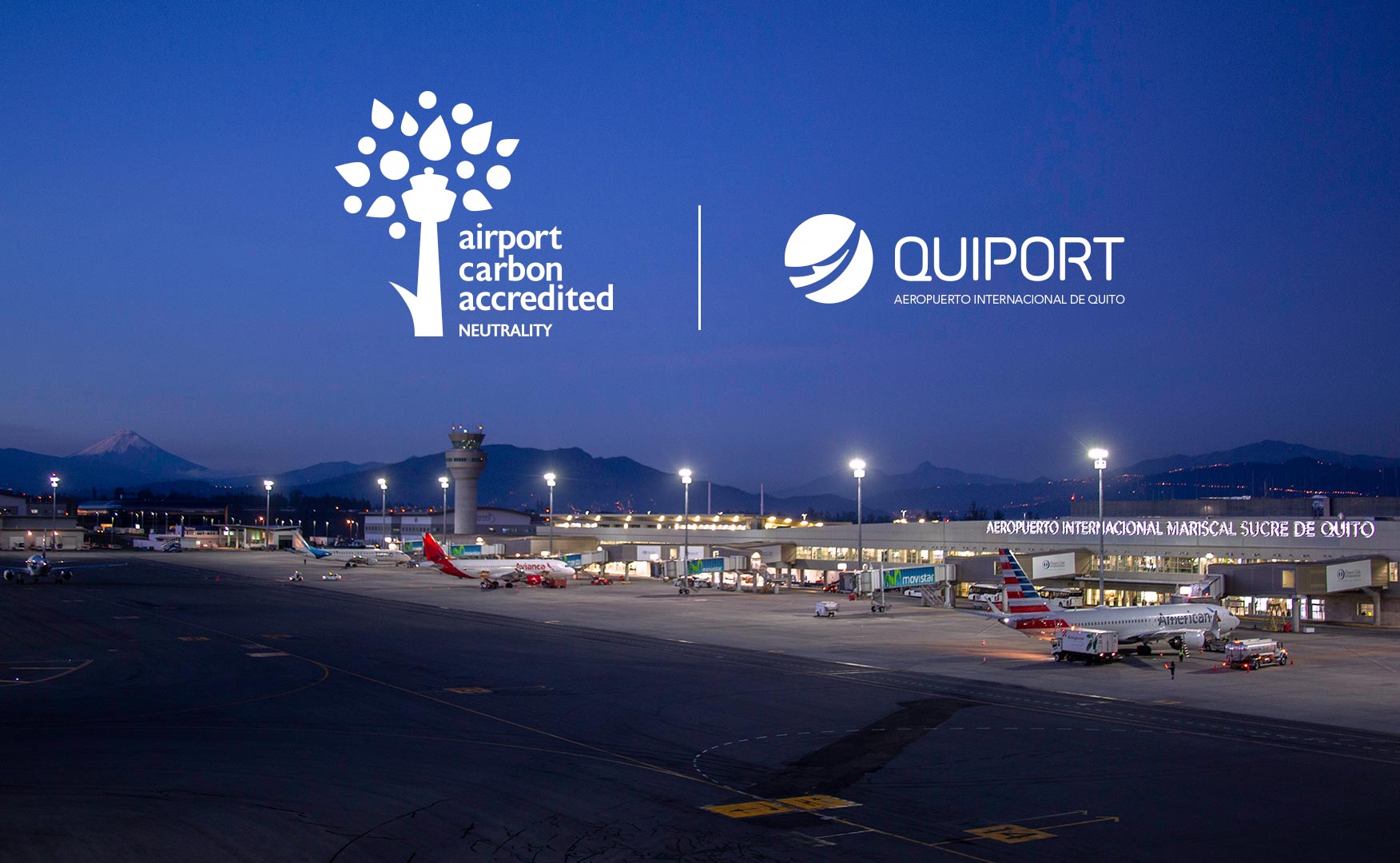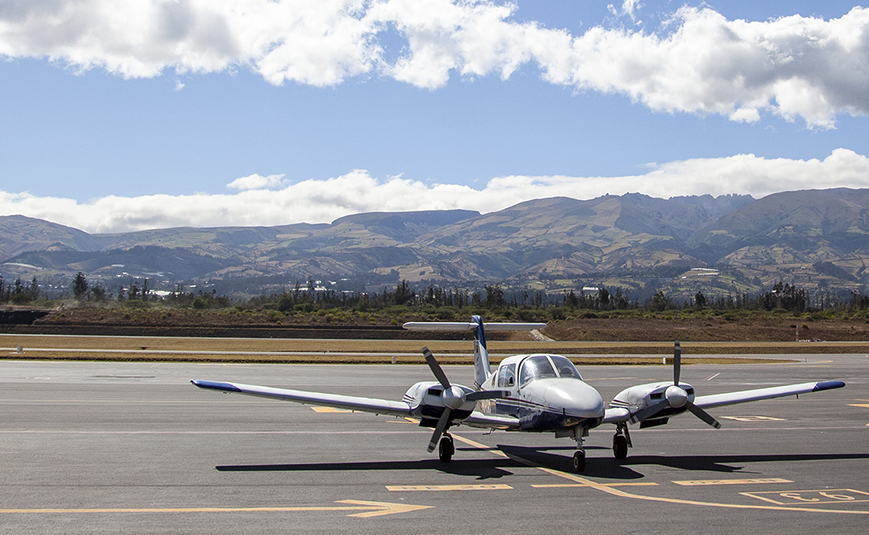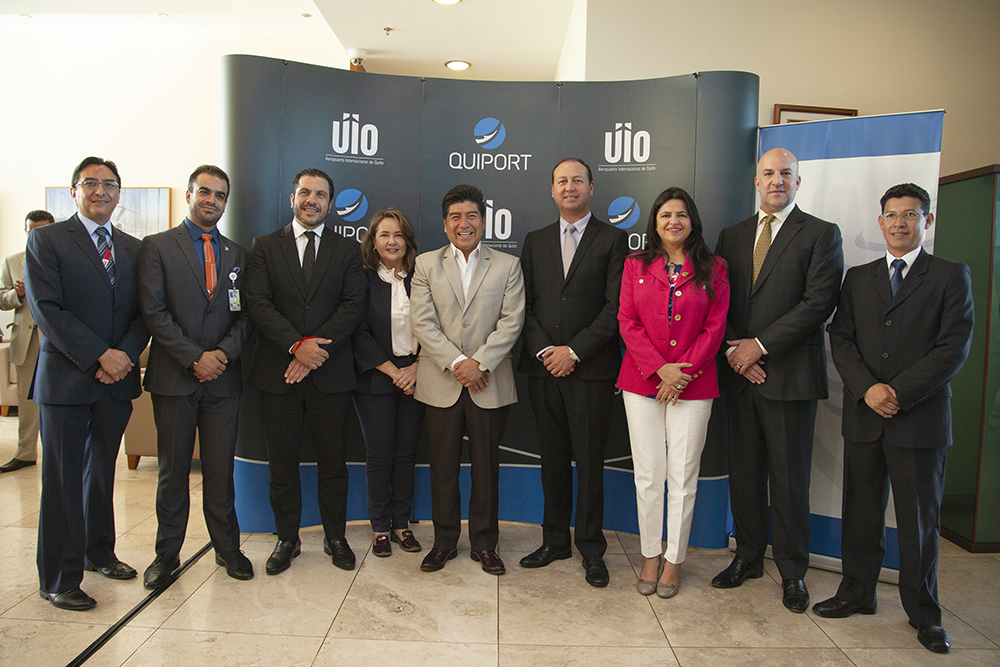Month: August 2019
QUITO AIRPORT ACHIEVES CARBON NEUTRALITY

- Corporación Quiport joined the Airport Carbon Accreditation program in 2015, and now Mariscal Sucre Airport is the first international airport in Latin America and the Caribbean to reach carbon neutral status.
Thanks to Corporación Quiport’s initiative and management, Quito International Airport has reached carbon neutrality in the Airport Carbon Accreditation (ACA) program which was created by Airports Council International (ACI World) and is technically endorsed by the United Nations International Civil Aviation Organization, the World Bank and the U.S. Federal Aviation Administration.
Our city’s airport has become the first international airport in the entire Latin American and Caribbean region to achieve carbon neutrality.
Regional Pioneers
“Corporación Quiport is one of the pioneers of this program. We joined ACA in 2015 and today we have completed the four levels of the program. Corporación Quiport’s initiatives to achieve this important accomplishment have included concrete actions to reduce greenhouse gas emissions, reduce fuel consumption, increase energy efficiency, improve water management, maintain conservation areas for flora and fauna and more”, says Andrew O’Brian, President and CEO of Quiport.
In July 2019, emissions for 2018 were measured and Quito Airport’s carbon footprint was calculated at 3,273 tons of CO2emissions, a 41% reduction compared to 2014 as the base year (5,534 tons of CO2).
Maintaining Neutrality
It is important to note that once carbon neutrality has been achieved, a plan must be set in place to reduce greenhouse gas (GHG) emissions in order to stay at this level of the ACA program. Each year, we will recalculate the carbon footprint and maintain or reduce the levels of emissions to avoid increasing the carbon footprint, as well as offset emissions for another year.
“We continue to work so that our efforts go beyond Quiport’s operations; to date we have amplified our impact by getting 26 companies at the airport, from airlines to commercial operators, to start their own initiatives to reduce their carbon footprints”, says Mr. O’Brian.
Sandro Ruiz, General Manager of Empresa Pública Metropolitana de Servicios Aeroportuarios y Gestión de Zonas Francas y Regímenes Especiales (EPMSA) – the municipal entity in charge of overseeing the airport concession – comments, “as the representative of the Municipality of Quito at the airport, EPMSA congratulates it on becoming the first international airport in Latin America to achieve carbon neutrality. This would not have been possible without the great dedication and efforts of Corporación Quiport, which has allowed a balanced ecosystem to be maintained at the Airport”.
Offsetting Emissions
Quiport offsets its direct emissions by buying certified carbon credits in sustainable projects. We have chosen the MANOA REDD+ Project which works to preserve 74,000 hectares of forest in Rondônia State, Brazil, which faces threats to its biodiversity from deforestation and illegal logging.
The certificate will be officially awarded at the ACI-LAC Annual Assembly this October in Bogotá.
MARISCAL SUCRE INTERNATIONAL AIRPORT WILL BE THE NEW PLATFORM FOR TRAINING COMMERCIAL PILOTS IN ECUADOR

- Quito International Airport is at the heart of the country’s aviation activity, thanks to the quality of its cargo and passenger operations and now as a professional training center.
- A key aim of the training school is to provide quality training based on the highest standards of the aviation authority.
With the aim to foster innovative teaching methods and train professional pilots, the ESAV Aviation School opened a new base of operations at the general aviation terminal of Mariscal Sucre International Airport in Quito. Corporación Quiport, the concessionaire in charge of managing and operating the airport, provides all the administrative and logistical facilities for the school’s operation.
Operations will be managed according to the availability of the students at the fully equipped facilities of Ecuacentair, which oversees the airport’s private aviation terminal. The aircraft which will be used in training are a CESSNA 172Q, registration no. HC-BMJ and a PA44-180T, registration no. HC-CRG. There is also a flight simulator certified by the Civil Aviation Authority of Ecuador.
For Quiport, it is a privilege to provide suitable infrastructure for aviation students so that they can prepare to take on the demands of the domestic aviation market, as a result of the standards reached in the air transport industry.
Andrew O’Brian, President and CEO of Corporación Quiport, explains that “our work approach aims to develop diverse activities related directly or indirectly to the air transport sector. It is important that at our facilities we incorporate the greatest number of links in the aviation industry value chain, which is why we have embraced ESAV’s operation with high expectations.”

The Municipality of Quito, through Empresa Pública Metropolitana de Servicios Aeroportuarios, arranged and assisted the process to open the ESAV Aviation School’s new operation in order to expand horizons in aviation education so that future generations can access excellent training.
Captain Gabriel Guapaz Bone, Operations Manager, emphasizes that “at ESAV Aviation School we train pilots; a pilot is an artist who is passionate about flight. Our mission as a training center is to train aviation professionals, and we are inspired by seeing our students’ dreams come to fruition”.
The ESAV Aviation School is a company dedicated to training pilots which was founded in 2009, and it is certified by the aviation authority. It creates training programs to produce competent, efficient pilots with the highest standards of quality.
